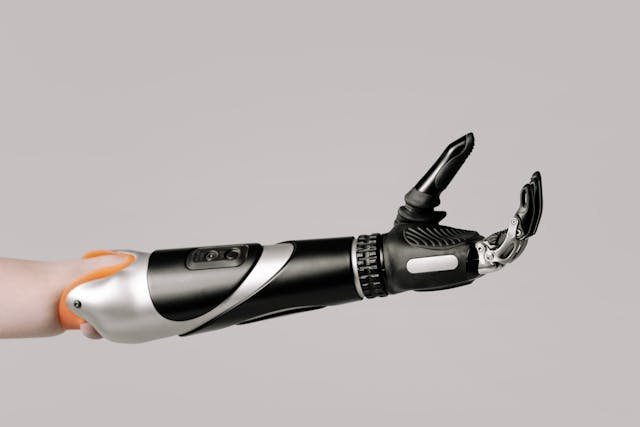The world of prosthetic design is evolving rapidly, and one of the biggest breakthroughs in recent years has been 3D printing technology. For individuals with wrist disarticulation, where the hand is amputated at the wrist while keeping the full-length forearm, traditional prosthetic solutions have often been expensive, heavy, and difficult to customize. However, 3D printing is changing the game, offering lightweight, cost-effective, and highly personalized prosthetic solutions.
Unlike conventional prosthetics, which require complex molding, expensive materials, and lengthy manufacturing times, 3D printing allows for fast, precise, and customizable prosthetic fabrication. This technology enables better fit, improved comfort, and enhanced functionality, ensuring that users regain mobility with a prosthetic that feels like a natural extension of their body.
In this article, we will explore how 3D printing is transforming wrist disarticulation prosthetic design, the benefits it offers, and what the future holds for this exciting innovation.
Why Wrist Disarticulation Prosthetics Need Innovation
Traditional wrist disarticulation prosthetics have significant challenges, making them a complex category of upper-limb prosthetic devices. 3D printing is solving many of these challenges by introducing lightweight materials, better flexibility, and advanced customization options.
Fit and Comfort Issues with Conventional Prosthetics
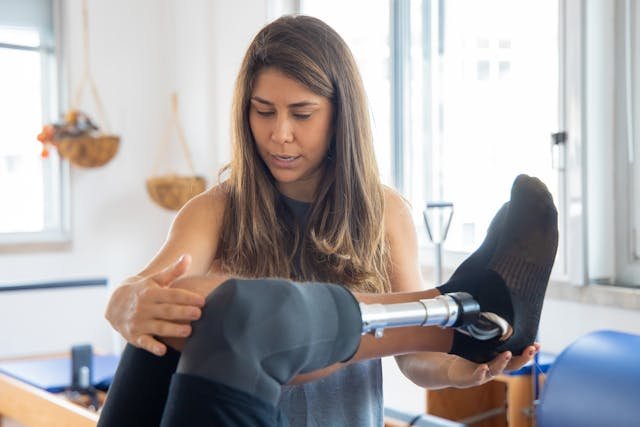
One of the biggest challenges with wrist disarticulation prosthetics is achieving the perfect fit. Because the full forearm remains intact, the socket must be designed in a way that allows for natural movement without restricting mobility. Traditional prosthetics often require rigid sockets that can cause discomfort, pressure points, and poor weight distribution.
With 3D printing, prosthetic sockets can be precisely customized to match the unique shape of a user’s residual limb. Advanced scanning and modeling techniques allow for personalized socket designs that distribute weight evenly, ensuring that users can wear their prosthetic comfortably for longer periods.
Weight and Bulkiness of Traditional Prosthetic Hands
Many wrist disarticulation prosthetics are heavy due to the materials used, such as metal and dense plastics. This added weight can cause fatigue, discomfort, and difficulty with fine motor tasks.
3D printing allows for the creation of lightweight prosthetic components using materials like carbon fiber-reinforced nylon or flexible thermoplastics. These materials reduce strain on the residual limb, making the prosthetic easier to wear and use throughout the day.
Limited Customization and Aesthetic Options
Traditional prosthetics are often mass-produced, offering little room for customization. Users must choose from a limited range of sizes and designs, leading to prosthetics that may not fully meet their needs.
With 3D printing, users can select from a variety of colors, textures, and functional designs, ensuring that their prosthetic reflects both their personal style and practical needs. Whether someone wants a sleek, modern look or a more natural skin-tone finish, 3D-printed prosthetics offer endless possibilities.
The Role of 3D Printing in Custom Socket Design
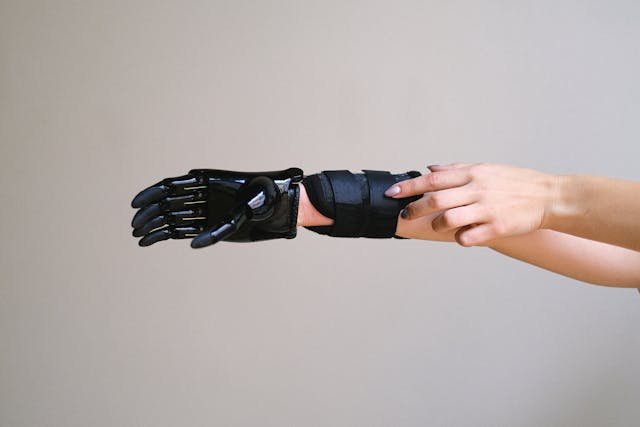
A well-fitted socket is the foundation of any comfortable and functional prosthetic. The socket connects the prosthetic to the user’s residual limb, and 3D printing has revolutionized socket design by making it more precise, adaptable, and user-friendly.
Digital Scanning for Precision Fit
Traditional socket fabrication involves manual molding, which can result in minor inaccuracies that lead to discomfort and pressure sores. With 3D scanning technology, a digital model of the residual limb can be created with millimeter-level accuracy.
This digital model is then used to 3D-print a perfectly contoured socket, ensuring a snug yet comfortable fit. This precision eliminates the need for frequent adjustments and reduces discomfort, allowing users to wear their prosthetic for extended periods without pain.
Adjustable and Modular Socket Designs
3D printing allows for the creation of modular socket systems that can be adjusted over time. Since a residual limb may change in size or shape, traditional sockets often require costly replacements.
With 3D-printed modular sockets, users can swap out different components or adjust the fit without needing a completely new prosthetic. This not only enhances long-term comfort but also reduces costs for users.
Breathable and Flexible Materials for Improved Comfort
Many traditional sockets can feel hot, restrictive, and uncomfortable, especially in warmer climates. 3D printing allows for the use of ventilated designs and flexible materials, creating lightweight, breathable sockets that improve airflow and reduce sweating.
These materials also provide better shock absorption, making activities like cycling, running, or playing sports more comfortable for prosthetic users.
Enhancing Functionality with 3D-Printed Hands and Joints
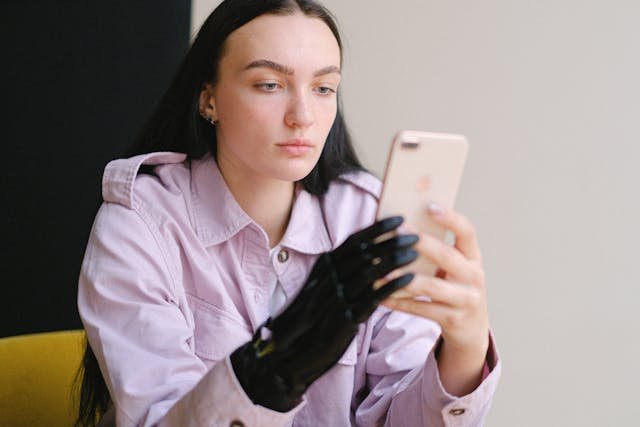
Beyond the socket, 3D printing is also revolutionizing the design of prosthetic hands, wrists, and joints, making them more functional, responsive, and durable.
Multi-Grip and Adaptive Prosthetic Hands
Traditional prosthetic hands often have limited grip patterns, making certain tasks difficult. 3D printing enables the development of prosthetic hands with multiple grip modes, allowing users to switch between power grips, pinch grips, and lateral grips with ease.
Some advanced 3D-printed hands are now integrating sensor technology that allows for semi-automatic grip adjustment, improving user control and precision.
Lightweight, High-Strength Materials for Durability
3D-printed prosthetic components can be made from strong yet lightweight materials, ensuring long-lasting durability. Advanced materials like carbon fiber-reinforced polymers provide exceptional strength while keeping the prosthetic light and easy to maneuver.
This makes 3D-printed wrist disarticulation prosthetics ideal for active users who engage in sports, physical work, or outdoor activities.
Integration with Myoelectric and Hybrid Systems
3D printing is making it easier to integrate myoelectric sensors into prosthetic hands, allowing users to control their prosthetic with muscle signals. Some new designs even feature hybrid systems that combine body-powered and myoelectric controls, providing greater versatility and adaptability.
The Future of 3D-Printed Prosthetics
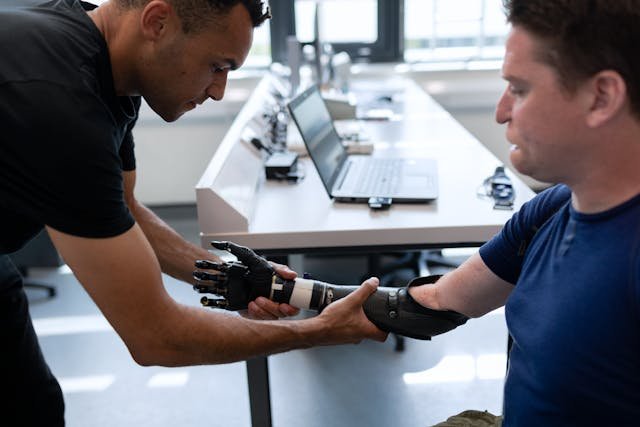
As 3D printing technology continues to advance, wrist disarticulation prosthetics are becoming more affordable, functional, and widely available. Future developments in biomechanics, artificial intelligence, and material science will further enhance prosthetic design and performance.
Affordable and Accessible Prosthetic Solutions
One of the biggest advantages of 3D printing is its ability to reduce costs, making prosthetics more accessible to a wider range of people. By eliminating the need for expensive molds and manual fabrication, 3D printing allows for the production of low-cost, high-quality prosthetics that can be easily customized and replaced when needed.
Advances in Smart Prosthetics
Future 3D-printed prosthetics will feature built-in smart sensors, providing real-time feedback to users. These sensors will help improve grip strength, track movement patterns, and even restore a sense of touch through haptic feedback technology.
Sustainability and Eco-Friendly Prosthetics
3D printing also opens the door to eco-friendly prosthetic designs using biodegradable or recycled materials. This innovation could lead to a future where prosthetics are not only more functional but also sustainable and environmentally friendly.
Real-World Impact: How 3D-Printed Wrist Disarticulation Prosthetics Are Changing Lives
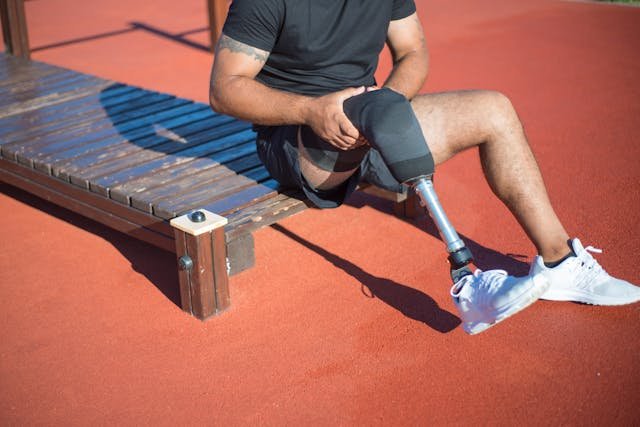
The true power of 3D printing in prosthetic design is best seen through the experiences of those who use these innovative solutions. By offering faster production times, improved functionality, and greater affordability, 3D-printed wrist disarticulation prosthetics are transforming the lives of individuals around the world.
Faster Access to Custom Prosthetics
One of the most significant advantages of 3D-printed prosthetics is how quickly they can be produced. Traditional prosthetics can take weeks or even months to manufacture, leading to long waiting periods for patients. In contrast, a fully customized 3D-printed prosthetic can be designed, printed, and fitted within days.
For individuals who need a prosthetic as soon as possible, such as those recovering from recent amputations or injuries, this rapid production time can make an enormous difference. It allows users to quickly regain mobility and independence, reducing the impact of limb loss on their daily lives.
Children, in particular, benefit from faster production cycles. Since they outgrow prosthetics quickly, traditional devices are often expensive to replace. 3D printing makes it easier to create adjustable, cost-effective prosthetics that can be updated as the child grows.
Improved Prosthetic Acceptance and Daily Use
Many amputees struggle to adjust to traditional prosthetics, especially when they are heavy, uncomfortable, or difficult to use. Because 3D-printed prosthetics are lightweight, well-fitted, and highly customizable, users find them easier to adapt to and incorporate into daily life.
A major reason for this success is personalization. Users can choose the design, color, and even texture of their prosthetic, making it feel like a natural part of their identity. Some opt for sleek, high-tech designs, while others prefer a more organic, human-like appearance. The ability to personalize a prosthetic increases confidence and emotional acceptance, making users more likely to wear and use it regularly.
Additionally, 3D-printed wrist disarticulation prosthetics offer better grip functionality, allowing users to perform everyday tasks such as typing, cooking, driving, or playing musical instruments with greater ease. The combination of comfort, functionality, and aesthetic appeal results in a higher rate of long-term prosthetic use.
Affordable Solutions for Wider Accessibility
Cost has always been a major barrier in prosthetic care, particularly for low-income communities or developing countries where traditional prosthetics are often out of reach. 3D printing is helping bridge this gap by providing affordable, high-quality prosthetics at a fraction of the cost of conventional devices.
Organizations and healthcare providers worldwide are now using open-source 3D-printing prosthetic designs to create low-cost, customized solutions for those in need. This approach ensures that prosthetic care is not limited by geography or economic status, allowing more people to access life-changing technology.
At Robobionics, we are committed to making high-quality, affordable, and customized 3D-printed prosthetic solutions available to those who need them most. If you or someone you know is looking for an innovative, cost-effective wrist disarticulation prosthetic, contact us today to learn more about how we can help.
Overcoming Challenges in 3D-Printed Wrist Disarticulation Prosthetics

While 3D printing has transformed prosthetic design, there are still challenges that need to be addressed to further improve functionality, durability, and accessibility. Researchers, engineers, and prosthetic specialists are continuously working to refine this technology, making 3D-printed prosthetics more advanced and reliable for everyday use.
Enhancing Durability and Strength
One of the primary challenges in 3D-printed prosthetic design is ensuring that the materials used are strong enough to handle daily wear and tear. Traditional prosthetics are made with high-strength metals and composites, whereas 3D-printed prosthetics often rely on plastics and polymers. While these materials are lightweight and flexible, they may not be as durable under heavy loads or prolonged use.
To address this, engineers are experimenting with reinforced 3D-printing materials like carbon fiber-infused polymers, titanium filaments, and high-performance resins. These materials provide a balance of strength, durability, and flexibility, making them more suitable for long-term prosthetic use. As material science advances, 3D-printed prosthetic components will become even more resistant to impact, stress, and environmental factors.
Additionally, new multi-material printing techniques are being developed, allowing different sections of the prosthetic to have varying levels of flexibility and rigidity. For example, a prosthetic hand can have rigid fingers for better grip strength while using flexible materials at joint connections to improve movement.
Improving Sensory Feedback and Control
One limitation of 3D-printed wrist disarticulation prosthetics is that they do not yet offer the same level of sensory feedback as some high-end, traditionally manufactured prosthetic hands. Without tactile sensation, users must rely solely on visual feedback to determine how much force to apply when gripping objects, which can make certain tasks more difficult.
To overcome this, researchers are exploring ways to integrate haptic feedback systems into 3D-printed prosthetic hands. Haptic feedback works by sending small vibrations or pressure signals to the user when the prosthetic hand makes contact with an object. This provides a sense of grip strength and object texture, helping users perform delicate tasks like holding a glass or typing on a keyboard with greater accuracy.
Another area of improvement is enhanced myoelectric sensor integration. Many traditional high-end prosthetics use advanced muscle sensors to detect even subtle movements in the residual limb. 3D-printed prosthetics are beginning to incorporate similar sensors, allowing users to control their prosthetic hands with greater precision and responsiveness.
Expanding Accessibility and Scaling Production
While 3D-printed prosthetics are more affordable than traditional options, access to high-quality 3D-printing facilities is still limited in many parts of the world. Not all hospitals and prosthetic clinics have the necessary equipment, software, or expertise to produce fully customized 3D-printed prosthetic limbs.
To solve this, some organizations are creating regional 3D-printing hubs, where prosthetic specialists can scan, design, and print custom prosthetics for users within days. These hubs could be placed in rural and underserved areas, improving access to affordable and personalized prosthetic care.
Additionally, open-source 3D-printing prosthetic designs are being developed, allowing prosthetists worldwide to download, modify, and print prosthetic components based on each user’s needs. This collaborative approach ensures that even in remote areas, amputees can receive high-quality, custom-fitted prosthetics at a fraction of the cost.
At Robobionics, we are actively working to expand access to 3D-printed prosthetic solutions by collaborating with healthcare providers, rehabilitation centers, and NGOs to make affordable, high-quality prosthetics available to more people in need.
Conclusion: The Future is Here
3D printing is revolutionizing wrist disarticulation prosthetics, offering unmatched customization, comfort, and affordability. From precision-fitted sockets to lightweight, high-strength prosthetic hands, this technology is making prosthetic solutions more accessible and advanced than ever before.
At Robobionics, we specialize in cutting-edge 3D-printed prosthetics designed for maximum comfort and functionality. If you are looking for an innovative, custom-designed wrist disarticulation prosthetic, contact us today for a consultation. Let’s help you regain mobility and independence with a prosthetic that truly fits your lifestyle.



